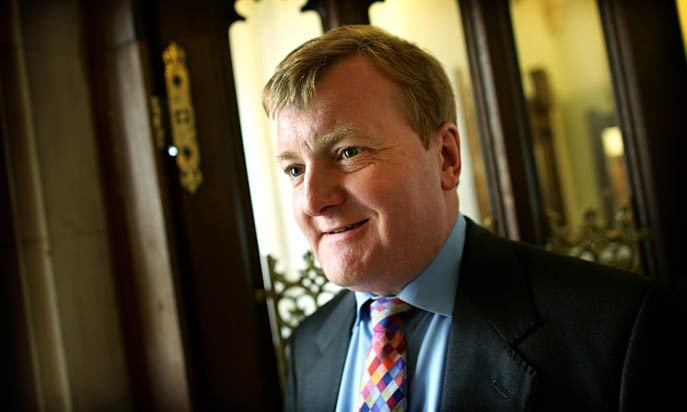
He was one politician who got everything right on the big issues of the day

Charles Kennedy, who died at a relatively young age of 55, spoke with an authentic voice in a language that struck chord with the electorate and with a clarity that eludes the synthetic politicians of today.
Kennedy joined the Labour party at the age of 15, but left it for Social Democratic Party when it was founded in 1981 by a group of politician disenchanted with Labour party’s leftist orientation. In 1983, aged just 23, he was called from the USA, where he was studying on Fulbright scholarship to fight the parliamentary seat from Ross, Scottish Highlands. He answered the summons by flying home and pulling off an unlikely victory by defeating Conservative energy minister Hamish Gray by 1704 votes. For the next thirty two years he retained the parliamentary seat before losing it in the Scottish National Party’s landslide in the 2015 elections.
Arriving at the House of Commons as Baby of the House, he rose through the ranks of Liberal Democratic which emerged from the merger of Social Democratic Party and the Liberal party. Charles Kennedy’s decisive vote for the merger was also his lasting contribution to the growth of a third party in British. Between 1990 and 1994, he was the president of the Liberal Democrats. In 1999, when the position of the leader of the party fell vacant following the resignation of the party leader Paddy Ashdown, Kennedy was quick to throw his hat into the leadership ring. He was able to win the leadership contest, thanks to his deep connection with party members.
On becoming the party leader, he set about repositioning the party to the left of the Labour where space had clearly opened up following Tony Blair-led right-ward drift of the party. His finest hour came when he, against the received wisdom at Westminster, decided to oppose Tony Blair’s rush to war in Iraq. In this, he was at one with the current of public opinion which was overwhelmingly opposed to war.
At the 2003 mammoth anti-war rally, he was the only high-profile politician to openly speak out against Britain’s involvement in the war on Iraq. This was to prove a defining moment for the Liberal Democratic Party and Charles Kennedy personally. The result was further electoral gains at the 2005 general election when the Liberal Democratic Party won the highest haul of 62 parliamentary seats. Yet Kennedy did not stay much longer at the helm of the party. Within a year, he was forced out of the leadership position after his alcohol addiction was leaked to the press.
He admitted to his addiction but vowed to stay on as the leader. His frantic efforts to cling onto the leadership position were decisively undermined when 25 members of his parliamentary party asked him to go. He resigned the next day. However, the larger party membership did not like the ouster move. Despite his humiliation, Kennedy nursed no grudges and ill-will against his parliamentary tormentors. Unlike other ex-party leaders, he gave full support to his successor Nick Clegg and did not give any comfort to those who wanted to bad-mouth the new leader.
However, Nick Clegg moved quickly to undo the Charles Kennedy-initiated left-of-centre orientation of the Liberal Democratic Party when he moved the party in the direction of a more liberal market philosophy. Kennedy only dissented from the party line over Nick Clegg’s decision to join the coalition, which he thought would damage the Lib Dems, and over his party decision to support the increase in tuition fees.
It is said that Charles Kennedy got everything right on the big issues of the day from the merger of the party to Iraq war and the Liberal Democrats’ coalition with the conservatives. The coalition, as predicted by Kennedy, cost the party heavily and the Lib Dems’ parliamentary seats were reduced to just 8 from 57 in the most recent elections of 2015.
The party is now in the process of electing a new leader following its worst ever performance at election. And the favourite to win the leadership contest is Tim Farron, who places him firmly in the political tradition of Charles Kennedy. This alone is testimony to the enduring influence of Charles Kennedy on his times and his party.
Despite losing his position as the party leader, Kennedy remained Member of Parliament for Ross, Skye and Lochaber constituency. However, between 2006-2014, his personal problems continued to mount. In 2010 he separated from his wife, Sara Gurgling, a PR executive. It was said at the time that his alcohol problem contributed to the separation.
Following his departure from the leadership position, he kept a very low profile in the House of Commons and outside. Apart from being a conviction and unstuffy politician, Kennedy was also a caring and decent human being, a rare trait in politics these days. He was devoted to his parents and lived next door to care for them. His father died aged 88, in April this year. This was a heavy blow to him. He also shouldered the sole responsibility of caring for his paralysed elder brother. Despite his melancholic highlander temperament and background, he was an internationalist in his outlook. He was one of the most passionate pro-European politicians in British politics.
Charles Kennedy was born in Inverness, Scotland, in 1955. His father, a crofter, was his lifelong inspiration. On winning a place at Glasgow University, he rose to be the president of the student union. He earned big reputation as a formidable student debater at Glasgow University. The only career he followed outside politics was his short stint as a journalist with the BBC. He has left behind his ex-wife, Sarah Gurling, and his son, Donald aged 10. His fans are deeply grieved at the sudden loss of a great leader who did not rise to the greater heights which his talents deserved.